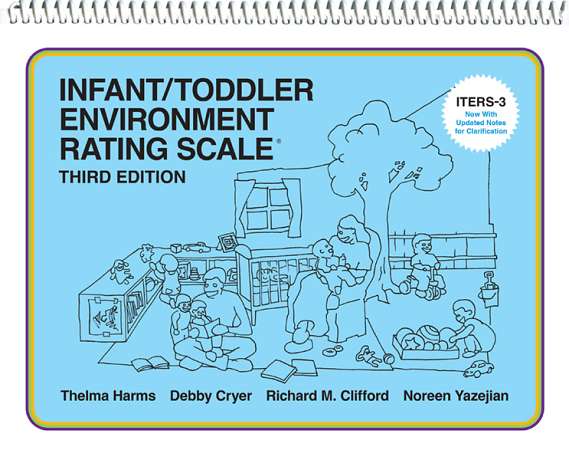Professors: Request an Exam Copy
Print copies available for US orders only. For orders outside the US, see our international distributors.
Third Edition
Thelma Harms, Debby Cryer, Richard M. Clifford, Noreen Yazejian
Publication Date: July 7, 2017
Pages: 104

This title is in the Environment Rating Scale® Family of Products—the leading research-based tools to optimize the quality of children’s early learning.
Building on extensive feedback from the field as well as vigorous new research on how best to support infant and toddler development and learning, the authors have revised and updated the widely used Infant/Toddler Environment Rating Scale®. ITERS-3 is the next-generation assessment tool for use in center-based child care programs for infants and toddlers up to 36 months of age.
ITERS-3 focuses on the full range of needs of infants and toddlers and provides a framework for improving program quality. Further, the scale assesses both environmental provisions and teacher-child interactions that affect the broad developmental milestones of infants and toddlers, including: language, cognitive, social-emotional and physical development, as well as concern for health and safety.
ITERS-3 is appropriate for state- and district-wide QRIS and continuous quality improvement, program evaluation by directors and supervisors, teacher self-evaluation, monitoring by agency staff, and teacher training programs. The established reliability and validity of the scale make it particularly useful for research and program evaluation.
While the approach to assessing quality and the scoring process remain the same for the new ITERS-3, users will find the following improvements informed by extensive use of the ITERS in the field and by the most recent research:
Suitable for use in inclusive and culturally diverse programs, ITERS-3 subscales evaluate:
Thelma Harms, Director of Curriculum Development Emerita, Frank Porter Graham Child Development Institute, University of North Carolina at Chapel Hill
Dr. Harms is recognized internationally for her work on assessing care and educational programs for children. Her early experience as Head Teacher of the Harold E. Jones Child Study Center, UC Berkeley for 15 years, and her subsequent role as Director of Curriculum Development at the Frank Porter Graham Child Development Institute prepared her to serve as lead co-author of the four Environment Rating Scales (ECERS, ITERS, FCCERS, and SACERS). Much of her recent training and consultation through the Environment Rating Scales Institute (ERSI) has focused on preparing professionals in the use of the scales for research, technical assistance, training, and program assessment in Quality Rating and Improvement Systems (QRIS) and similar quality enhancement projects in the United States and abroad.
Debby Cryer, Scientist Emerita, Frank Porter Graham Child Development Institute, University of North Carolina at Chapel Hill
Dr. Cryer is now retired from the University and works with the Environment Rating Scales Institute. She was a principal investigator for the national study on Cost, Quality and Child Outcomes in Child Care Centers, continued those interests in the European Child Care and Education Study, and has studied the effects of providing continuity of caregiver to infants and toddlers. She is the lead co-author of a curriculum called “All About Preschoolers.” She regularly provides consultation on establishing quality rating and improvement systems. Dr. Cryer frequently lectures and provides training on the scales, both in the United States and internationally.
Richard M. Clifford, Senior Scientist Emeritus, Frank Porter Graham Child Development Institute, University of North Carolina at Chapel Hill
Dr. Clifford has written and consulted extensively on child and family policy issues with special emphasis on the role of government in the provision of early childhood services. In addition, he has done research on early learning environments and their impact on young children. He was Principal Investigator on the National Center for Early Development and Learning study of state funded pre-kindergarten programs and Co-Director of the companion SWEEP study. He was also one of the principal investigators on the Cost, Quality and Child Outcomes in Child Care Centers study. He helped establish and served as the first director of the North Carolina Division of Child Development. Dr. Clifford is a past president of the National Association for the Education of Young Children.
Noreen Yazejian, Senior Research Scientist, Frank Porter Graham Child Development Institute, University of North Carolina at Chapel Hill
Dr. Yazejian has extensive experience conducting large-scale, multi-site research and evaluation studies exploring questions about early education quality and children’s outcomes, particularly for children living in poverty. Her early childhood research and program evaluation studies have focused on professional development, models of programming birth to 5, home visiting, quality rating and improvement systems, early childhood language and literacy, and the use of data for continuous quality improvement. Her research has been published in Child Development, Early Childhood Research Quarterly, Early Education and Development, Social Policy Report, and NHSA Dialog.
“The Environment Rating Scales have proven to be an invaluable resource for assessing the quality of child care classrooms. These comprehensive tools truly allow providers to see classrooms through the eyes of the children they care for and the results obtained offer clear feedback that helps teachers improve and grow.”
—Angela Keyes, assistant professor of psychiatry, Tulane University Director, Quality Start Assessment Team of Louisiana
FAQ for ITERS–3
Professors: Request an Exam Copy
Print copies available for US orders only. For orders outside the US, see our international distributors.